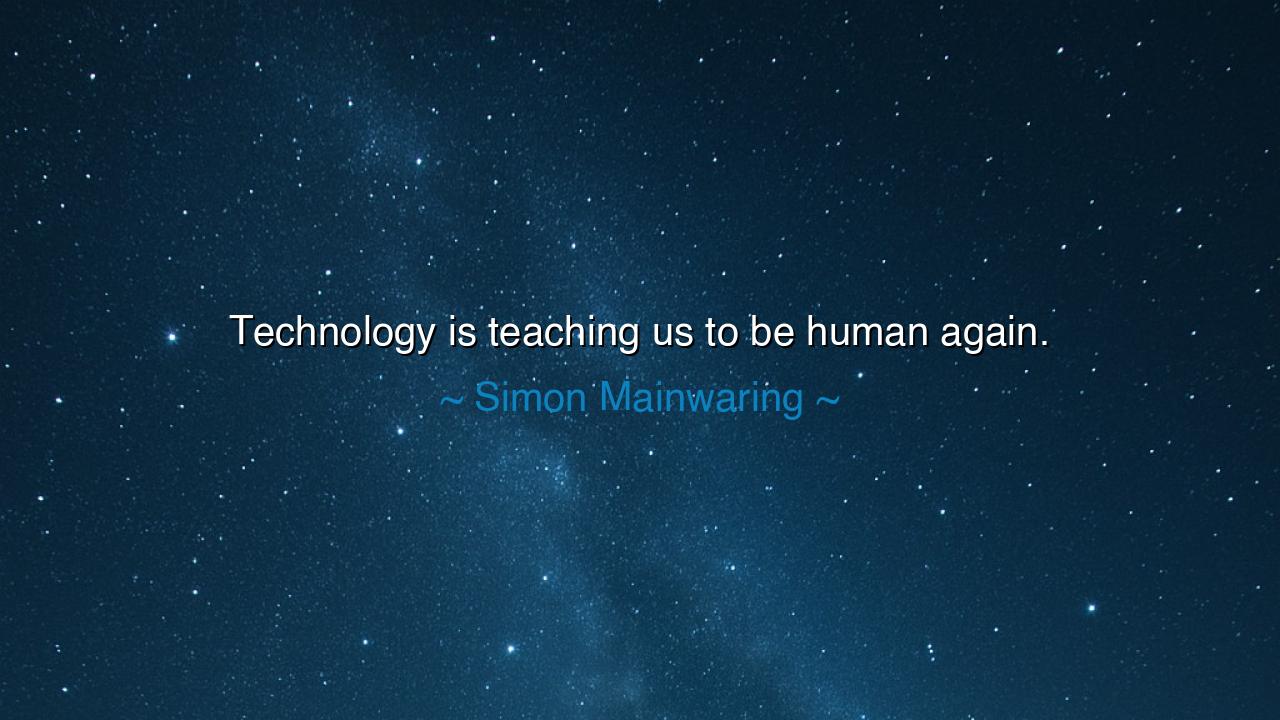
Technology is teaching us to be human again.






Hear the words of Simon Mainwaring, spoken with paradox and hope: “Technology is teaching us to be human again.” At first, these words seem strange, for many fear that machines make us less human, pulling us into distraction, into coldness, into disconnection. Yet within his saying is a deeper truth: that the very tools we have built, though born of steel and code, are reflecting back to us what it means to feel, to care, to connect, and to remember that our greatest strength has never been in the machine, but in the heart.
For every age has forged technology, and every age has feared its loss of humanity. The plow, the printing press, the steam engine, the telephone—all were seen at first as threats to the natural rhythms of life. Yet each, in time, became a mirror, reminding us of what it meant to be human in a changing world. So it is today: though we live amidst glowing screens and silent circuits, technology is also awakening us to compassion across distance, to solidarity across borders, to the urgent need to wield our creations not only for power, but for empathy.
Consider the story of social media in times of disaster. When earthquakes, floods, and fires have struck, people once lost in isolation were able to call for help, to connect, to be heard. Strangers have rushed to aid, guided by the voices carried through digital space. Here, technology became not the death of humanity, but its revival—reminding us that our essence is not the tool itself, but the bonds of care and the will to answer another’s need. Thus Mainwaring’s words shine with meaning: through our inventions, we rediscover our calling to be human.
History too offers a testimony. During the plague years of the fourteenth century, death tore communities apart, and yet the invention of the printing press soon after helped restore a sense of shared humanity. By spreading knowledge, faith, and art, it wove people together across nations. What at first seemed like cold machinery became the vessel of human spirit. So too, the digital age—though cloaked in algorithms and code—may serve as the press of our time, spreading awareness, uniting voices, and teaching us again the values of cooperation, kindness, and solidarity.
But we must not mistake Mainwaring’s words as a promise without condition. Technology alone does not make us human; it is our choice in how we use it. If we wield it for greed, for vanity, for cruelty, it will harden our hearts and enslave us. Yet if we wield it for service, for connection, for healing, it will awaken in us the essence of humanity that so easily sleeps beneath comfort and pride. The machine cannot teach us love unless we first seek love through the machine.
The lesson is plain: let technology serve as a mirror. Let it remind us of what we long for most deeply—not efficiency, not wealth, not conquest, but fellowship, justice, and compassion. In the face of division, use it to unite. In the face of suffering, use it to heal. In the face of ignorance, use it to illuminate. Then truly, technology will not diminish humanity but magnify it, turning our scattered voices into a chorus of shared destiny.
Practical wisdom stands before you: do not be ruled by your tools, but master them. Ask of every invention: does it bring me closer to others, or does it build walls between us? Use your devices to listen, to learn, to uplift, to share truth rather than falsehood. Build with your hands, even in the digital realm, works that honor the dignity of life. In this way, technology will become your teacher, not of coldness, but of compassion, reminding you always of the ancient calling to be human.
So let Mainwaring’s words echo within you: “Technology is teaching us to be human again.” This is not the death of the spirit, but its rebirth. It is the call to awaken within the machine the heart of man, to remember that all our inventions are only extensions of the soul. And when we wield them with wisdom, they will teach us again the eternal truths of patience, kindness, and love—the truths that no age, however advanced, must ever forget.






AAdministratorAdministrator
Welcome, honored guests. Please leave a comment, we will respond soon